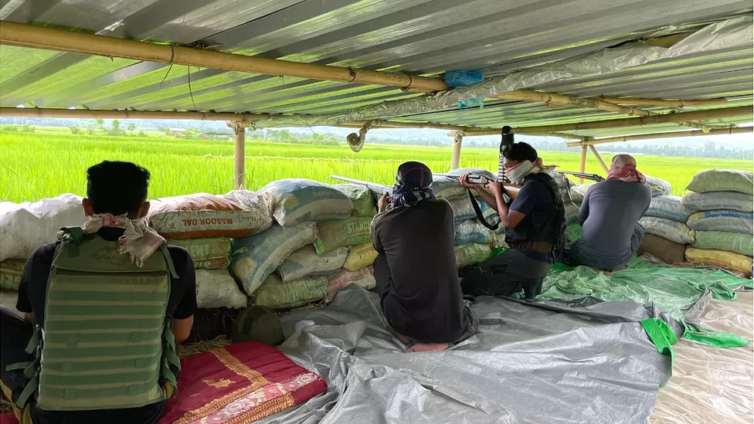The four men kneeling in the makeshift bunker face out over a lush green paddy field, their guns resting on a wall of cement sacks. Bamboo poles prop up the corrugated tin roof.
Wearing homemade bullet-proof vests, they train their weapons - mostly old single and double-barrelled shotguns - on a rival bunker less than a mile away. A belt of cartridges hangs from one of the poles.
The men are all civilian members of a "village defence force" - among them a driver, a labourer, a farmer, and Tomba (whose name we have changed to protect his identity). Tomba ran a mobile phone repair shop before the deadly ethnic conflict erupted in May in India's north-east Manipur state.

Warning: This article contains details of violence that readers may find upsetting
The segregation of communities in this corner of the world's fastest-growing major economy feels like a heavily militarised border separating countries at war.
"We have to protect ourselves because we don't think anyone else will. I feel scared but I have to hide it," Tomba said.
He and the other three in the bunker belong to the majority Meitei community, who largely follow Hinduism.
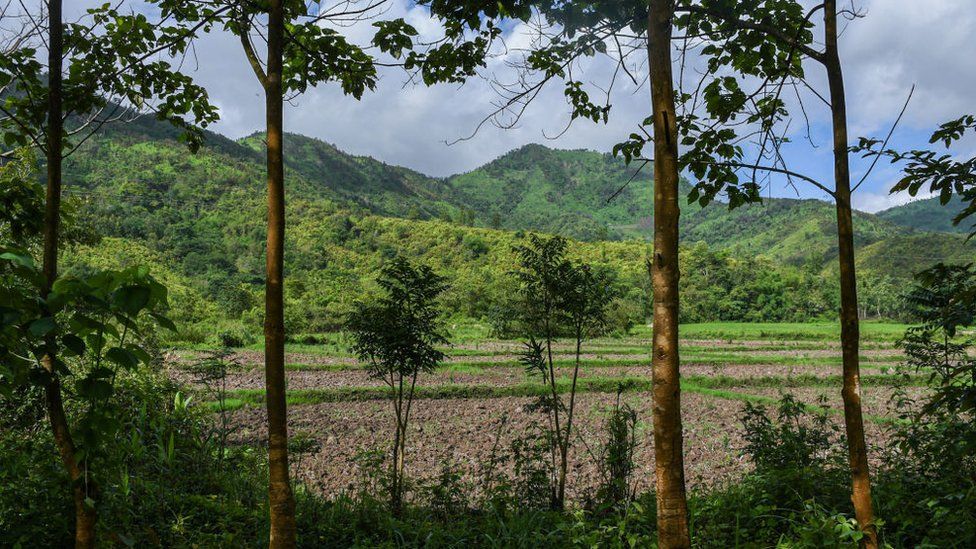
GETTY IMAGES
A sense of fear is all pervasive in Manipur since shocking violence between their community and minority Kuki groups broke out, marked by brutal killings and sexual crimes against women. More than 200 people have been killed, roughly two-thirds of them Kukis, a collective name for the Kuki, Zomi, Chin, Hmar and Mizo tribes who are mostly Christians.
On 4 May, two Kuki-Zomi women were paraded naked by a mob of Meitei men. The younger woman was allegedly gang-raped, her father and 19-year-old brother beaten to death.
We met her mother. The family can't be identified according to Indian laws on rape.
"To see how my daughter was treated after my husband and son were killed, it made me want to die. My husband was a church elder. He was soft-spoken and kind. His arms were slashed with knives. My son was in the 12th grade, a gentle boy who never fought with anyone. He was brutally beaten with rods," she sobbed as she spoke.
"He was killed because he ran after them [the mob] to try to save his sister. My daughter has not recovered. They were killed in front of her.
"She has trouble eating and sleeping. I can never be at peace after what was done to my family."
Despite a police complaint being registered in May, no investigation into the incident took place until a video of it surfaced on social media in July. That's when the conflict in Manipur caught the attention of many in India and around the world.
It's also when Prime Minister Narendra Modi broke his silence on Manipur.
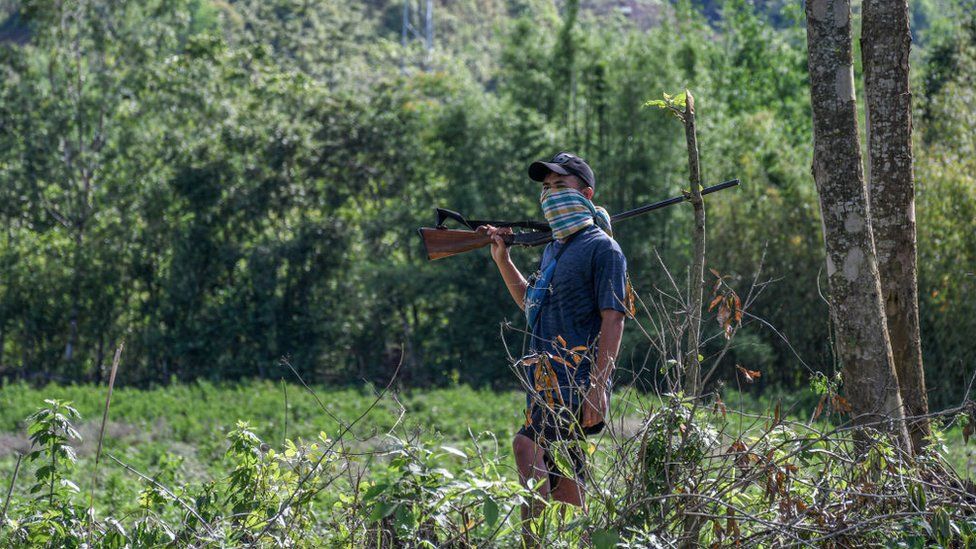
GETTY IMAGES
Accounts of how the violence started differ. The Meitei community lives mostly in the state's more prosperous Imphal valley, which makes up roughly 10% of Manipur's area.
The rest of the state - relatively underdeveloped hill areas - are home to minority groups, among them the Kukis who have been given tribal status. It's a constitutional safeguard aimed at protecting the land, culture, language and identity of India's historically disadvantaged communities.
It's also why Meiteis are not allowed to buy land in the hills. Kukis can buy land anywhere in the state.
On 3 May, Kuki tribes held rallies protesting against a move to grant tribal status to the Meiteis.
Kukis accuse hardline Meitei groups of carrying out orchestrated attacks against minority families living in Imphal and surrounding areas. Meiteis say it was people who participated in the Kuki march who turned violent first.
The BBC cannot independently verify what happened, but in the first few days of the violence, those killed were overwhelmingly from the Kuki minority.
Hundreds of homes belonging to people from both communities were set on fire or destroyed, churches and temples burnt. Some 60,000 people across both communities are estimated to be displaced, most still living in schools, sports complexes and other shelters, unable to return home.
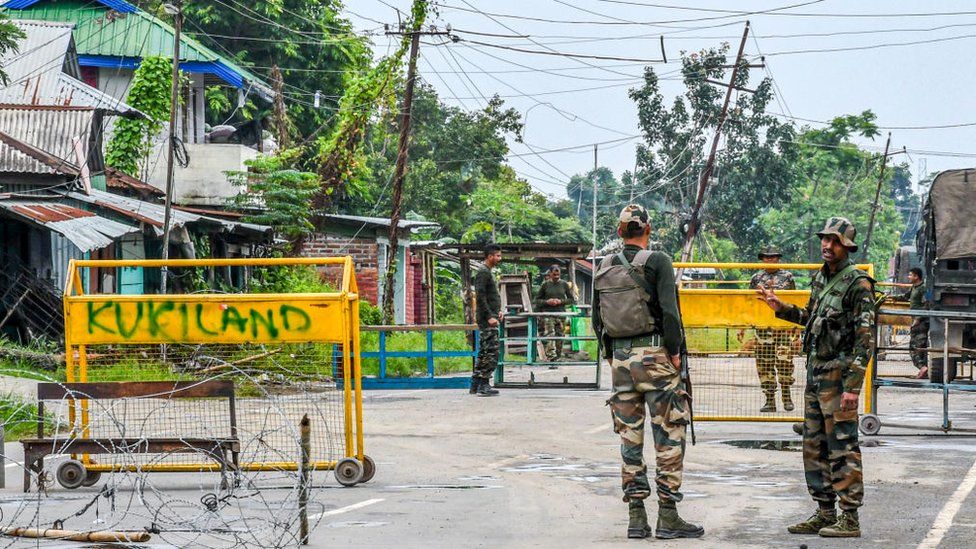
GETTY IMAGES
Four months on, the Meiteis and Kukis are completely physically segregated, forbidden to enter areas the other dominates.
When travelling the 60km (37 miles) from Meitei-dominated Imphal to Kuki-dominated Churachandpur in the south, we had to cross seven police and army checkpoints.
On both sides, we also had to show our press badges and answer multiple questions at checkpoints run by dozens of civilian women. We couldn't have entered without their approval - an indicator of the lack of government control.
When we met Tomba at the Meitei bunker, we were struck by how openly he and others were carrying weapons, seemingly unafraid of being caught by the police or security forces. In both Meitei and Kuki areas near the de facto borders we frequently saw civilians walking freely with weapons, sometimes even in the presence of police and security forces. The BBC also saw minors holding guns.
"I was trained to use a gun two months ago by former military personnel in my village," Tomba, who's in his thirties, told us. "The villagers collected these guns and gave them to us."
He says they are on guard round the clock. "It's mandatory that one man from each family does a shift at a duty post, and one woman is stationed at checkposts.
"In our experience the police don't get deployed in time. And we don't trust security forces run by the national government. They are deployed on the Kuki side, so how come the Kukis manage to still come across to our villages?"
An explosion which sounded like that of a mortar shell went off as we left the bunker. It's hard to tell which side it was fired from.

Tomba's answer exposes another layer of this complex conflict. The Manipur police report to the state government, run by Chief Minister N Biren Singh. People from the Kuki community have told us they don't trust Mr Singh or the Manipur police.
Also stationed in Manipur are troops from Assam Rifles, a counter-insurgency force that reports to the Indian national government. People from the Meitei community have told us they believe Assam Rifles are siding with the Kukis.
Thousands of weapons were looted from police armouries in Meitei-dominated areas.
The Manipur Police and Assam Rifles didn't reply to BBC questions about whether they have sided with either community and why all armed civilians were not being apprehended and checked for licences.
The police directed us to their account on X, formerly known as Twitter, where they have been posting photos of weapons they have recovered and seized. At least six police officers are reported to have been killed in Manipur since the violence began.
Assam Rifles sent us a pre-recorded video address by their director general who said they are seizing weapons and performing their duty in an unbiased manner.
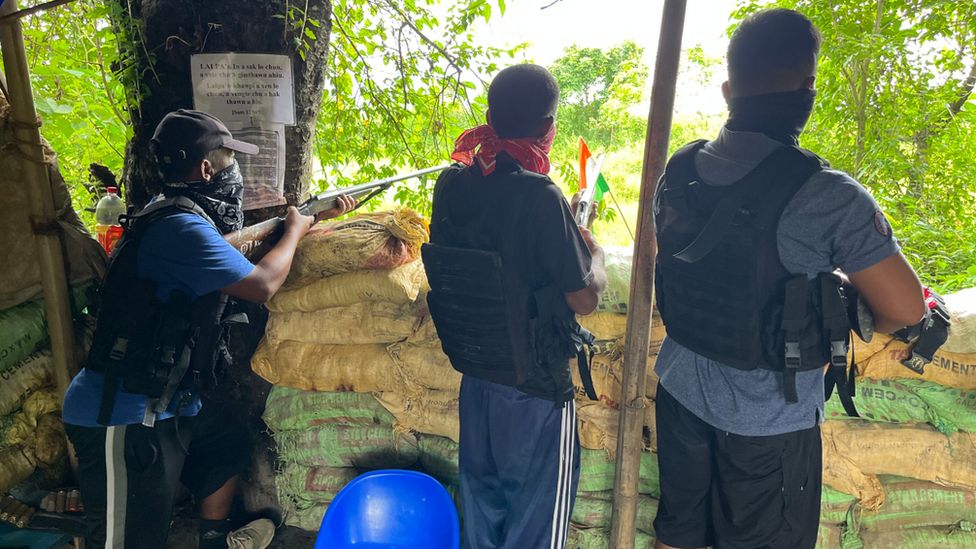
Less than a mile from Tomba's position, in a similar but opposing bunker, sits Khakham (not his real name), holding a double-barrelled shotgun. From the Kuki-Zomi tribes, he is a labourer and subsistence farmer.
"We are not here with evil intentions. We do not want violence. We are compelled to take up arms to defend ourselves against the Meiteis," he said.
"There have been instances where the police have allowed them to slip through. They can't be fully trusted," he claimed.
Khakham's account of how he got his gun and training was similar to Tomba's.
The language of war is in use on both sides. The area between the two bunkers is referred to as the "front line", "buffer zone" or "no man's land".
"We can never live together with the Meiteis again. It's impossible," Khakham said.
It is easy to understand how the enmity has become so bitter and deep so quickly, when you hear the details of the violence.
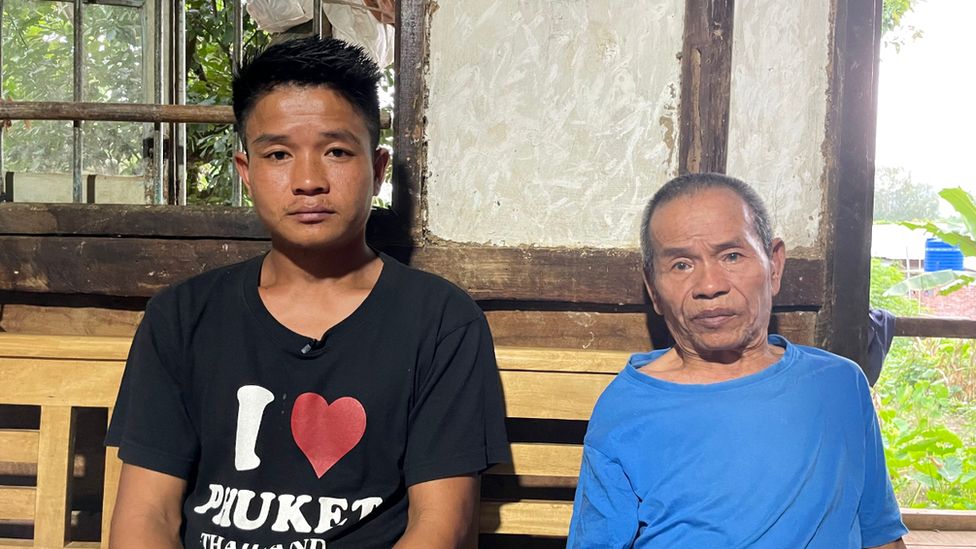
David Tuolor, a 33-year-old Kuki-Hmar man, was part of the Langza "village defence force". David's family says he was captured from his village and killed by Meitei mobs on 2 July.
In a video that surfaced online soon after his death, his battered, severed head, is seen stuck on a fence.
"It was so painful seeing that. I have trouble sleeping," Abraham, David's younger brother, told us. "I don't even keep his photos on my phone, because when I see them, it keeps coming back. It hurts and I start to think of disturbing things."
Abraham says David was tortured and hacked to death, and his remains burnt. They have found only a few bones that they believe belong to him.
Five days after David's death on 7 July, 29-year-old Ngaleiba Sagolsem, a Meitei man, went missing from near a Kuki-dominated area in northern Manipur.
One day later a video surfaced of him, kneeling on the ground, hands tied behind his back, his face bloodied, crying as he's beaten by a group of men. Two months later another video emerged showing him in the same position, then being shot in the head and pushed into a ditch.
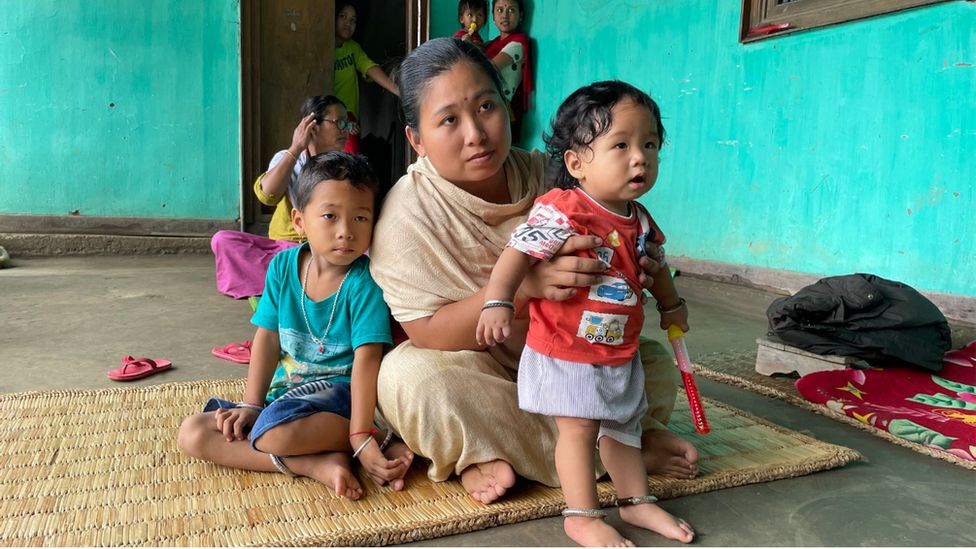
Ngaleiba's family believes he was killed by Kuki men.
He had met and fallen in love with his wife Silbiya 10 years ago while they were still at school.
"He was a simple man, loved by everyone. He had a childlike quality and loved playing with our children. Our life was filled with joy and contentment," said Silbiya, tears rolling down her cheeks.
Their two boys are four and seven months old.
"My elder son keeps asking where his father is. Since we haven't received his body, I sometimes think he'll return. I open the door and look for him. I call his phone," she wept.
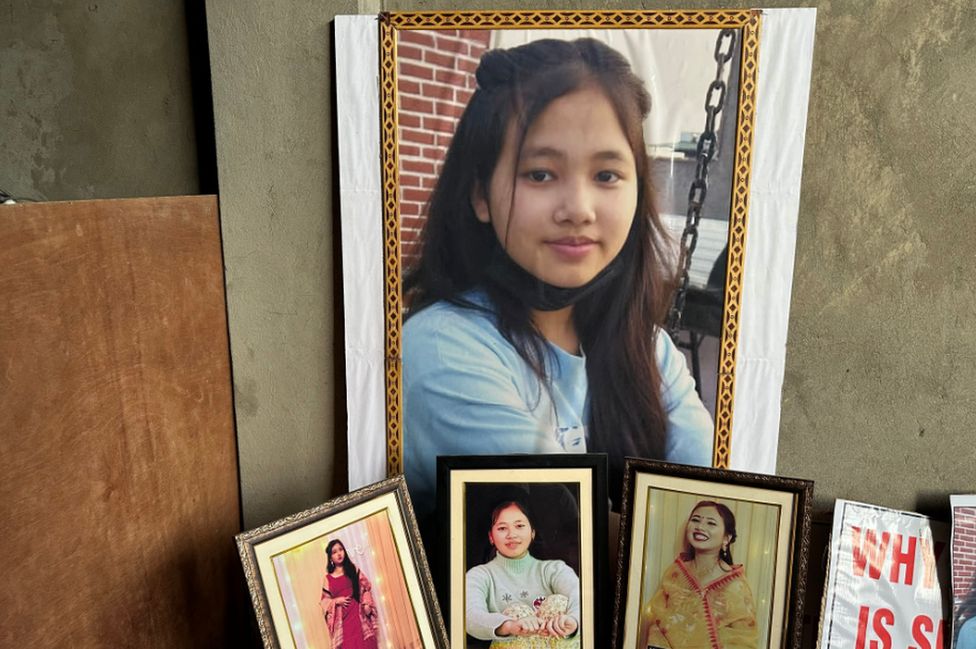
In Imphal city, another family is living in despair, desperate for news of their daughter. On 6 July, 17-year-old Meitei girl Linthoingambi Hijam went missing with her male friend Hemanjit Singh near a Kuki-dominated area.
Their phones were switched off. With the help of people from his community, her father Kulajit Hijam claims they found the boy's phone was turned on a few days later with a Sim card registered in the name of a Kuki woman.
"No one is helping us find out what happened to my daughter. I feel powerless," he said.
"I know that if she's able to talk to the people who have her, she'll convince them to let her go. I feel like she is going to surprise me by returning."
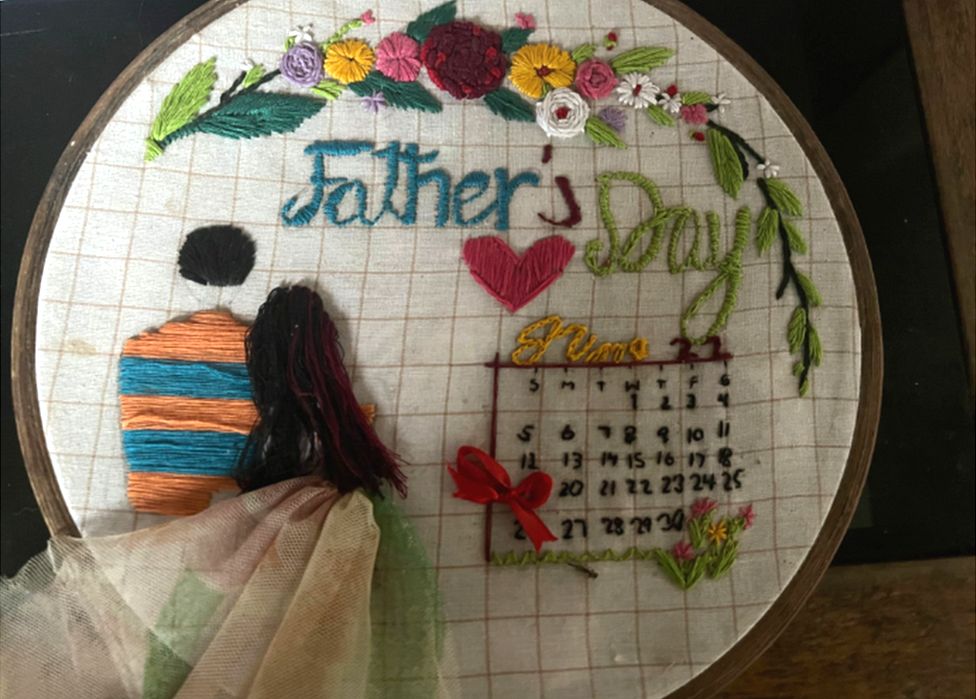
With no dialogue being facilitated between the two sides so far, and police unable to visit Kuki areas, for people like Kulajit, there is no place to turn to for answers.
Land rights only partly explain the tensions. Meiteis have more political influence in the state, with most of its chief ministers belonging to the community.
Another point of tension is an influx of people from tribes ethnically similar to Kukis from war-torn Myanmar, which shares a long border with Manipur. Illegal opium poppy cultivation in the hills has also been a source of friction.
People from the Meitei and Kuki communities have told us they are unhappy with the Manipur state government - the Kukis accuse it of supporting violence against them, while the Meiteis allege it did nothing to stop the violence from spreading.
Manipur Chief Minister Biren Singh's office didn't respond to the BBC's request for an interview or our questions sent via email.
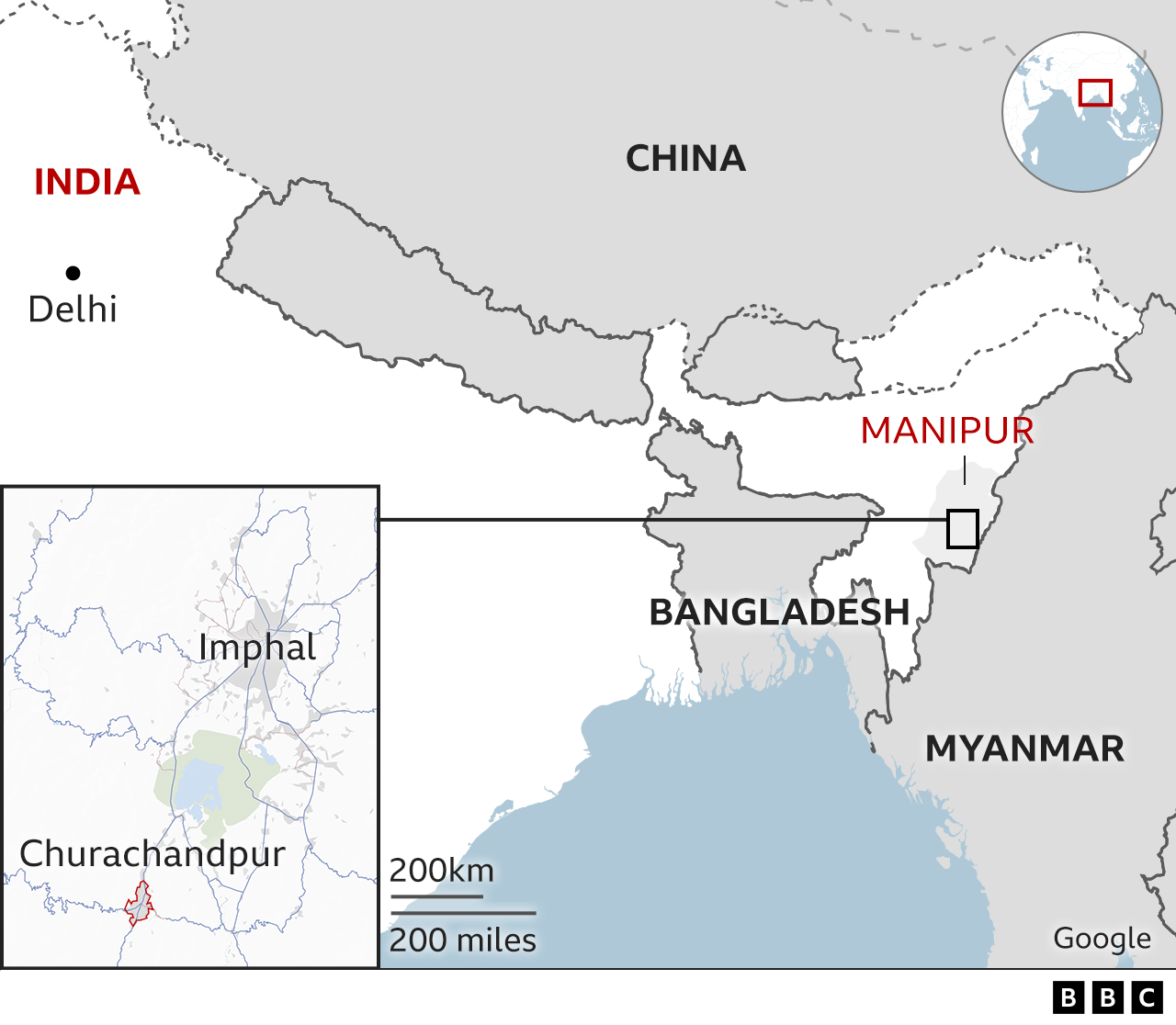
Both communities express disappointment in India's national government.
"I felt disheartened that Prime Minister Modi only spoke after the video of Kuki women. It made me unhappy. Isn't Manipur a part of India? Then why are we being neglected?" Tomba asks, sitting in the Meitei bunker.
The Manipur government is also run by Mr Modi's Bharatiya Janata Party (BJP). And so, many in the state believe that if the national government wants, it can resolve the crisis quickly.
"We haven't heard anything from them [India's government] for months. We feel they do not care about the lives or suffering of so many innocent Indian citizens. We are clearly not a priority," Khakham said, adding that Kukis are demanding a separate administration in the state.
Prime Minister Modi has said: "Peace is slowly returning to Manipur."
But there have been at least five instances of violence in the past three weeks alone, the latest this Sunday when an Indian army soldier on leave was abducted from his home in Imphal and killed.
With thousands of armed, angry and scared civilians, the situation remains extremely volatile.
Latest Stories
-
60 out of 100 bills passed into law in the last 4 years – Bagbin
1 hour -
Julius Debrah leads charge as Mahama makes first major appointments ahead of inauguration
1 hour -
Afenyo-Markin is wrong, ORAL is widely accepted by Ghanaians – Ahmed Ibrahim
2 hours -
Thousands rock AfroRave 2024 for Afrocentric extravaganza
2 hours -
RYTHM in Action: QNET donates food and other essentials to the Potter’s Village Orphanage
2 hours -
Akufo-Addo denies reports of presidential pardon to 11
3 hours -
Ambulance case: Gov’t didn’t want to jail you at all cost – Afenyo-Markin to Ato Forson
3 hours -
Minority was a thorn in my flesh – Afenyo-Markin
4 hours -
Minority Leader’s full address on dissolution of 8th Parliament
4 hours -
Afenyo-Markin laments unfinished business as 8th Parliament dissolves
4 hours -
Godfred Dame was determined to use all crude tactics to achieve my prosecution – Ato Forson
4 hours -
AG’s prosecution against me was meant to intimidate – Ato Forson
4 hours -
ORAL a needless committee, only for personal vendetta – Afenyo-Markin
4 hours -
Afenyo-Markin commends Ato Forson for leading a resilient Minority side in 8th Parliament
4 hours -
Silent empowerment: Rural-urban women take control of family planning behind closed doors
4 hours

